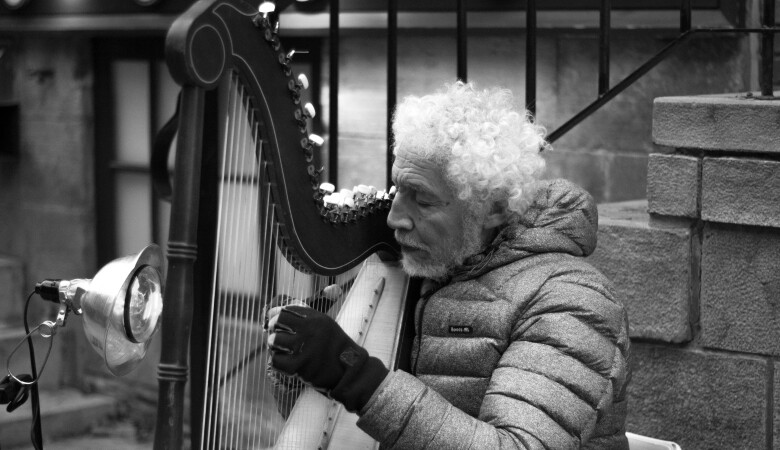Jesus Gives Everything, Demands Everything (Matthew Sermon 78 of 151)
May 20, 2007 | Andy Davis
Matthew 16:21-25
Introduction
“Love so amazing, so divine, demands my soul, my life, my all.” I was trying to think about that demand. I have found it, as I go on in my Christian life, to be the most difficult demand of the Christian life. Every single day, I feel the weight of the passage that I'm going to preach today, every day. I was trying to picture in my mind what it is that Jesus is calling us to. I began thinking about those fish. I didn't know that much about them, but you know, the fish that swim upstream all the time because that's what it feels like to me. And I came across the Alaska King Salmon and the more I learned about their journey, the more incredible it seemed to me. These are fish that are spawned in some stream in Alaska somewhere, some little tributary, and they eventually make their way down that river, and out into the Bering Sea and into the Pacific Ocean, and they swim 2000 miles. Their bodies change a little bit, so they're able to exist in salt water and they just live there until they come to maturity. Then the time comes, how they know it I don't know, but the time comes for them to go back home. They begin the most arduous, most incredible natural journey I've ever heard of some of those salmon swim 2400 miles upstream the entire way. Giving everything they have and amazingly, and we don't really know how, they make their way, not back to the original river, not even back to the original tributary, but the little creek where they were originally born, and there they spawn and a week later, they die. The journey upstream takes 90% of their fat and 50% of their protein from their body. They have nothing left to give by the time that they're done. That's the picture that I have in my mind of our text today. That's an astonishing natural journey, isn't it? It's a natural journey. All of the King Salmon make the journey.
Jesus Calls Us to Deny Ourselves
But Jesus in this text is calling on us to make a supernatural journey. It's one that we cannot make by our own strength and power, not by willpower, not by the power of our mind, not by the power of our might or our own strength or determination, we cannot live this Christian life. It is a supernatural life to which Jesus is calling us. Why is this? Because here in this text, He's calling on us to deny ourselves, and to take up our cross and to follow him. Each human being on the face of the earth, doesn't matter what nation or tribe or language or people they're born into, every single human being is born with a fanatical commitment to themselves. Fanatical. It is the central idolatry of the human race. We will do almost anything to please ourselves. Only good parenting teaches an infant slowly to behave better in public and get along with six billion other people who have the same goal: to please themselves. That kind of parenting goes on all over the world, and somehow, we manage to co-exist. But there it is. The flow, the natural flow of human personality in this matter is an even greater force than the whitewater of those Alaskan rivers that those salmon are swimming against. It's a constant drive. It is purely natural for every descendant of Adam and Eve, to be fanatically devoted to self, to pursue selfish interest in every conversation, in every food we choose, in every left and right turn we make in the automobile, every website we visit, every movie we watch, the ambitions for our career, the way that we interact with people, it's there all the time. At every moment.
Here in this text, Jesus is calling on you and me to behave supernaturally, to deny ourselves, to swim upstream against your desire to save yourself, and coddle yourself, and prefer yourself, and love yourself and cherish yourself and feed yourself and nourish yourself, every single moment of your life. He's calling on you to deny that and to follow him. This, and I say to you, only this kind of life is the life that leads to heaven. Be not deceived, this is the life that leads to heaven, and no other. Jesus is calling on us to live the kind of life he lived, a life of self-denial; a life that led him to leave his father's throne, to take on a human body, to take on the very nature of a servant, being made in human likeness, and to deny himself even to the point of death, even death on a cross. That's the life Jesus lived. It is absolutely astonishing to me how much Christ gave for us. I picture him on the cross, I picture him, his blood flowing out of his body, I picture him fulfilling final prophecies, the last few that had to get done, taking that wine vinegar, and dealing with people as his blood is flowing out. As they're taking his garments and gambling for them, in order to fulfill prophecy so that he might be identified as the savior, fulfillment of prophecy, he breathes out his last and says, "It is finished. There is nothing left to give." Do you see it? He gave absolutely everything for us, and He did that in order to give absolutely everything to us that we might be completely forgiven of all of our sins, that we might find in God, not a wrath-filled righteous judge who would righteously send us to hell for what we've done, but rather a loving Father that we would be adopted into his family. That's what Jesus came to buy for us, that we might receive the indwelling Holy Spirit, adopted into the family of God, given a worthwhile life of service to him, brothers and sisters in Christ. Then it really gets good. Then we are transformed, we lose our sin nature, and made like him, like him we rise, we receive resurrection bodies, and we live in those bodies forever and ever, free forever from all death, and mourning, and crying, and pain. This is what He came to give, He gave everything for us to give everything to us.
Loyalty to God Must Come Before Everything, Even Ourselves
But now in this text He demands everything from us —every moment of your life, every moment of my life, this is what he demands, and anything less than this is less than what he demands. He uses stark language in other places, "If you don't hate your mother and father and your wife and your children and even your own life, you cannot be my disciple." He says to the rich young ruler, "You have to sell everything you have and give to the poor and you'll have treasure in heaven. Then come follow me." In the parable about the treasure hidden in the field and the parable of the Pearl of Great Price, in both cases they had to sell everything to get it. This is the life that leads to heaven. Look what it says in verse 24 and 25, "And Jesus said to his disciples: If anyone would come after me, he must deny himself and take up his cross and follow me, for whoever wants to save his life will lose it, but whoever loses his life for me will find it." This is the relentless call of Christ. Deny, carry, follow and die.
Now, let's understand the context. Jesus had made an amazing prediction to his disciples. They were not able to hear it, they did not understand it. Verse 21, "From that time on Jesus began to explain to his disciples that he must go to Jerusalem and suffer many things at the hands of the elders, chief priests and teachers of the law, and that he must be killed and on the third day be raised to life." This is the first time he really began to explain all of these things so that they understood. He was teaching them, from that point on; he was getting them ready. Peter was shocked. I think they all were, but you know Peter, so frequently the spokesman for them all. He vocalizes what I think all of them are feeling, but in a really amazing and shocking way. Look at verse 22, "Peter took him aside," this is Jesus now, "You're the only begotten son of God, the word of God, through him all things were made and without him nothing was made that has been made. This is God in the flesh, the son of the living God," said Peter. He took the Son of the living God aside and began to rebuke him. Is that not shocking to you? It should be.
Do we behave any differently in times of affliction? Do we begin to rebuke God in our prayers and begin to murmur against him? We tend to do it, but here's Peter, he takes him aside and begins to rebuke him, "Never Lord," he said, "This shall never happen to you." Perhaps even more shocking is what happens next. Verse 23, "Jesus turned and said to Peter: Get behind me, Satan." Now, there's no question that Jesus loved Peter. There's no question that Jesus is going to take Peter to Heaven. He has given him a role unlike that of anyone else other of the apostles in building the church. This is an incredible role; He was giving him the keys to the kingdom of heaven. Jesus loved Peter, but here he says to Peter, "Get behind me, Satan. You're a stumbling block to me, you do not have in mind the things of God, but the things of men."
Now this is an important principle, our loyalty to God must come above all other relationships. It is true that from time to time, even loved ones can be used by the devil to deter us from a course that God wants us to take. At that point you must deal with it quite vigorously. It's more important even than the good feelings we have in a pleasant relationship. Satan was using Peter and Jesus says, "You're a stumbling block to me, that the word is literally bait stick, you're like bait luring me into a trap. I can't go in there. I came to die, so get behind me, Satan," says Jesus to Peter. But then He lists his focus up off of Peter on to his disciples, and really through his words, on to all of us, the whole world, then He said to his disciples, "If anyone would come after me, he must deny himself, and take up his cross and follow me, for whoever wants to save his life will lose it, but whoever loses his life for me will find it." This is a universal call, it's not just for Peter and it's not just for the apostles that were standing around him at that point, it's for everybody.
What was Peter's immediate motive? Jesus said, "You do not have in mind the things of God, but the things of men." I don't think that Peter was so much concerned about Jesus here, although I'm sure that it was there, but I think he was concerned about his own selfish interests. Peter's own future was wrapped up in Jesus. Jesus had just conferred on him the keys of the kingdom, whatever that meant, and the keys of a kingdom aren't worth much if the king is dead, because usually they gather up all of his right-hand men and they arrest them too and put them to death. So, if Jesus is going to be arrested and killed, the future is bleak for Peter too. What good would it be to be the keeper of the keys of a kingdom in which the king is killed? Peter, I think, is motivated at this moment by selfish interests. He wants to save his own life, he wants to save his life physically, and he wants to make it as rich and powerful and pleasureful as possible, that is natural.
Satan’s motive is selfish, he wants to gain everything for himself. Like him, we want to gain everything for ourselves. God's motives, the things of God, is to put his glory and his kingdom above every other concern. That's what Jesus meant when He said, "You do not have in mind the things of God, but the things of men." An aside that's encouraging is that in the end Peter learned how to do this, in the end he learned how to deny himself. Now he had a tough journey to travel, and the difficulty of that journey is what's in my heart as I preach this message today. It's a difficult journey to learn how to deny yourself and take up your cross and follow. Peter hadn't learned it by the time Jesus died. That's why he denied knowing Jesus three times that night, he wanted to save his own life. He wasn't ready yet.
Afterward, church tradition tells us that he willingly was crucified upside down in fulfillment of the prophecy made in John 21, that he would by his death glorify God. In the end Peter learned, and we can learn too by God's grace how to deny ourselves and take up our cross and follow, but Peter didn't know at this point.
What Does It Mean To Take Up Your Cross Daily?
What is this call? Let's understand it, first of all, deny yourself. Deny yourself. Say no to what you think are your immediate best interests. What it is you want for yourself as you think it's best, what your flesh is demanding, turn away from it. Secondly, take up your cross. Willingly stoop and pick up a heavy article of death and carry it the rest of your life. Now in the minds of the disciples this wasn't merely theoretical, it wasn't a symbol at that point, it was a physical thing, a piece of wood on which people died, they were executed. It is estimated that in the life of Jesus 30,000 people were crucified in Palestine. Think about that. So, when Jesus said, "Take up your cross," they were picturing some of those condemned prisoners who they had seen dying along the roads. That's shocking enough, to picture Jesus up on a cross is shocking, but to be told you have to deny yourself and take up your cross, very very difficult. This must be a metaphor, because we're told to do it daily. You take up a physical cross, and you go out to its logical end, this is your last day on Earth probably. Physically, you're going to die. It's an article of execution. So, this is something that clearly is a metaphor for something, but it's not to be minimized. It's not merely some distressing burden in your life, like a physical problem, like cancer or chronic illness, difficult relationship, difficult marriage, difficult parenting situation, financial difficulties, people speak of these things as my cross to bear. That's not what he's talking about here. No, it's much deeper than that. It's much stronger than that. It has to do with the self, the very self, the flesh.
George Müller was a man used mightily by God to care for, over his lifetime, the daily needs of 10,000 orphans, 10,000 orphans, that's incredible to me. He was asked the secret of his success in ministry, and he made this statement, "There was a day when I died, utterly died, to George Müller. His opinions, preferences, tastes and will died to the world, its approval or censure, died to the approval or blame even of my brethren and friends, and since then, I have studied only to show myself approved unto God." I've thought much about that statement. Theologically, what he says is true, if you're a Christian, that was the day you died by faith in Christ, you've been united with Christ in his death. Galatians 2:20, "I have been crucified with Christ, and I no longer live. The life I now live in the body, I live by faith in the Son of God." It's a whole different thing. I died that day. But I also think that it's somewhat of an inadequate statement in terms of what I'm talking about today. There isn't a day I died, this call stands over me every single day, every Sunday, every Monday, every Tuesday, every single day, I must die to myself. That is the only secret of success in the Christian life. That's what George Müller says it means to take up your cross and follow Christ. Follow him wherever he goes, follow in his footsteps, follows his daily life in consecration to the Heavenly Father. He is leading to Calvary, that's where he's going, he's going to the cross, he's going to death, but he's not going to stop there. He's going beyond it to the resurrection and to eternal life beyond, that's where he's leading. “Follow me and I'll take you to heaven. Stop finding your life, stop finding it in earthly achievements and possessions and experiences, stop finding it there. Lose your life here in this world and find it eternally.” That's the call. It’s for every disciple, not just the apostles, and it's every day of your life. He says in another place, in Luke 9:23, "Then he said to them all, if anyone would come after me, he must deny himself, and take up his cross daily and follow me."
So, what is the cost? Well, picture the King Salmon. How would you like to be a King Salmon? How'd you like to jump a few waterfalls today? Doesn't it feel like that, swimming against the stream of what you want at every moment? Take those cute little babies home from the hospital. Oh, they're so sweet. You hold them in your arms, and they look so angelic but at the heart of that person is what I've already said, a fanatical commitment to self. Oh, it's true, isn't it moms? You know what I'm talking about. Three in the morning, they don't care about you at all. As I've mentioned before, they're not asking, "Gee, you know moms had a hard day. I'm going to let her sleep a few more hours till six, and then I might nudge her awake a bit because I have a need." They're not thinking like that. If they have a need, they'll let you know. Fanatical commitment to self. Friends it's not gone, is it? It's still in there. That's what He's calling on you to stop asking, “What's in it for me?” This is an issue of sin. It's not genocide, or rape or grand theft auto or premeditated murder where we could dispense with it, say, "I'd never do that." No, this is the sin of selfishness, and that, I believe, is the root of it all.
Richard Baxter in his counseling work, in The Christian Directory said this, "Selfishness is the radical, that is the root positive sin of the soul. Comprehending in seed form and as a primary cause of all other sins." That's quite a statement. Selfishness is the cause of all wars, all marital squabbles, all lawsuits, all luxury, all poverty, all addictions, all parenting struggles, all church splits, all vaulting ambition, basically any and every trouble between human beings comes from selfishness. Now consider positively how sweet life would be if there were no selfishness on earth. How sweet your family life would be if none of the members ever thought about their own needs, but only what was beneficial for others. How sweet would life be free from selfishness. Let me tell you something, if you're a Christian, we're going there, some day.
We're going to that world where we will be free from this affliction, free from it forever. We will be lost in wonder and praise toward the only one who deserves that kind of devotion. It's not ourselves, it's God. We'll be free from idolatry, the idolatry of self. That's where we're heading. Where did it come from, that is the question. What happened inside the mind of Satan, that first turned him away from worshipping and honoring God? You get an indication in Isaiah 14 prophetically speaking, I think to Satan. "You said in your heart," listen to these five I wills. "I will ascend to Heaven, I will raise my throne above the stars of God, I will sit enthroned on the mount of assembly on the utmost heights of the sacred mountain. I will ascend to the tops of the clouds, I will make myself, like the most high." This created being made by Jesus himself has the audacity in the desert to say to Jesus, "Fall down at my feet and worship me."
It's incredible, that's what he's like. Vaulting soaring ambition, and we followed suit. We kind of joined in with him in the Garden of Eden. We joined Satan's rebellion in our devotion to selfishness. That's where it came from. It's everywhere. Satan has woven selfishness, into all the worldly appeals with which he destroys human souls. I was looking at a secular magazine, recently, relatively tame, Better Homes and Gardens, I think it was. I'm not speaking against Better Homes and Gardens. I'm just talking about an ad I saw there. It was for a Cadillac SUV and the caption was, "Seats seven comfortably. One, ideally." Ouch, I mean they just openly advertising selfishness these days. I was intrigued, so I started flipping through and I started seeing some more. There was an ad there for a diamond anniversary ring that a husband, I guess, named Michael could buy for his wife. There were two rings pictured, one above, one below, one was a quarter carat and the other one-and-a-half-carat or maybe half carat and a full carat if you can afford that. Under the half carat the caption was, "Oh Michael, you shouldn't have." Under the full carat it just said, "Oh, Michael."
Okay, so half carat, it wasn't enough. Another ad mentioned a vacation retreat. "Giving you the luxury, you deserve." Now, ponder that one friends. Ponder it theologically. What luxury do we deserve? That word “deserve” has become very powerful for me in my Christian life. Like a Godly pass to an answer, "How you doing?" "Better than I deserve." Didn't matter what was going on, better than I deserve. What luxury do we deserve? Another ad spoke of a spa where you could shamelessly pamper yourself. There are some people that can do that. We are surrounded daily in this world by people who are driving and pushing and striving to meet their own selfish needs, who if you let them go first, they'll say it's as it should be, and look on you as a weak person to be dominated. But if you don't let them go first, they'll become murderous with rage. That's the world we live in.
But it's not just out there friends, it's in here. The church has insufficient sanctification in this matter. We're not enough like Jesus here. That's a problem. Again, Richard Baxter said, "Selfishness is the hardest sin in the world to overcome." Even for the person who seems to have put sin to death the best, if you cross them in their self-interest, or opinion or seem to slight them or have a low esteem of them, what swellings, what hard burnings, what proud impatience, if not schisms or separations will result. Isn't it true? Don't you feel it inside, when someone crosses you? It's still there. James said, "No man can tame the tongue. It's a restless evil full of deadly poison." I say to you, "No man can tame selfishness." It's beyond us to do. All of this adds up, in my opinion, to a constant battle, and I call it, "The bitterest battle of your life." Jesus gives us a paradox, the world's wisdom as we've already noted is “grab all you can, look out for number One.” Many people live in this world like snarling junkyard dogs, ravenous, fighting over some half meaty bone. Brothers and sisters, for us, it should not be so, we shouldn't be living like that rather the Christly wisdom is give all you can. Look at verse 25, "Whoever wants to save his life will lose it, but whoever loses his life for me will find it." This is the life that Jesus lived. 2 Corinthians 8:9, "For you know the grace of our Lord Jesus Christ that though He was rich yet for your sakes, He became poor, so that you through His poverty might become rich." Jesus said in another place that, "It is more blessed to give than to receive." It's a happier thing to give than to receive. It's the mentality of a servant, and I tell you, it is the most unnatural thing in the world. Jesus gives us this great paradox. The great lie in this world, is that this world is all there is, and if you're going to be happy, you need to get as much of the good stuff in this world as you can while you live.
Satan pursues his own selfish agenda, every day, and that's what he's selling to us and the lie is, if you do it, you'll be happy. If you're not happy, you're not doing it enough, so drink more of it and sooner than later, you'll get happy at some point. It's a lie, it's just a lie, is Satan happy? Is he a happy being? He does what he wants every day, pursues his own selfish agenda every day, an anti-God agenda. He is not happy. Scripture says, "He is filled with rage, because he knows his time is short." There's a figure in Daniel 11, the anti-Christ figure, who gets to rule the whole world. He gets to win every battle, he gets to have all the stuff, the gold and the silver in Egypt, he gets it all. Is he happy? No, when someone crosses him, he's filled with rage and gets his army together and goes to fight him. This is the kind of life, the destination of which most people are heading. That's where they're going. I don't want to go there. It's not a life of happiness and joy. It's a paradox.
Sacrifice, the Only Source of Happiness
I was reading recently a Wall Street Journal article May 2nd, 2007 by Jonathan Clements named, “No Satisfaction: Why, what you have is never enough.” It's a secular article, “We may have life and liberty,” he writes, “but the pursuit of happiness isn't going so well. As a country, we are richer than ever, yet surveys show that Americans are no happier than they were 30 years ago. We constantly hanker after fancier cars and fatter paychecks, and initially such things boost our happiness, but the glow of satisfaction quickly fades and we're yearning for something else.” He gives no solutions in the article, he just diagnoses. He says, "Maybe we were not wired for happiness, maybe we were meant to be miserable or maybe we're just not good at predicting what really will make us happy." Those are the two great answers he gives. I tell you, he's wrong. We were wired for happiness. We were made for pleasure; we were made for joy. In the right hand of God, we find it and that eternally forever more, we were made for that. I agree with him; we are bad naturally at predicting what will make us happy. Jesus tells us, "Turn away from all of this. Follow me and I will make you happy." That's what He's telling us here. "For whoever wants to save his life will lose it, but whoever loses his life for me will find it," and it wasn't to mean to save your life. I think it means to spare it, protect it, defend it. Let it not be sacrificed in any way or harmed in any way. To originally guard your life in this sort of way, to be unwilling to sacrifice anything for Jesus. Romans 8:32 however, speaking of the Heavenly Father said, "He who did not spare His own Son, but gave Him up for us all. How will He not also along with Him, graciously give us all things?" He didn't spare Jesus, but we spare our lives. Don't do it. Don't spare your life. Don't love your life so much as to shrink from death. John Wesley was visiting a wealthy plantation owner and spent the day riding on horses, looking at a portion of all that this man owned. It was an amazing spread. When he got done, the plantation owner said to John Wesley proudly, "Well, what do you think?" Wesley paused for a moment, looked him in the face and said, "I think it's going to be hard for you to leave all this." Now, in what sense does he need to leave it? Well, I don't know, I don't know what Jesus would say, Jesus gives different counsel to different people. Maybe Wesley meant even eternally. Jesus says, "Forget it, forget it, turn your back on it. Follow me and you'll have treasure in Heaven."
What does it mean then to find your life in Christ? It means to find a right relationship with God, full forgiveness of all sins, a hope that the future life is going to be better than anything we can possibly imagine. Not worrying whether you get paid back here in this world, not worrying whether people notice how good you are or notice that thing you did, doesn't matter, it's entrusted to God for a future day. We are to live like that, looking ahead, looking ahead to a glorious day. The person who lives the first way, grabbing selflessly, they're going to lose it all, in death and then in the second death on Judgment Day. There's a second death and on Judgment Day, the great reversal happens. People who lived grabbing selfishly, they lose everything, and the people who gave up everything for Christ, they get it all and they get it eternally.
Now we've explained the text, how do we apply it? Dietrich Bonhoeffer said in his classic work, The Cost of Discipleship, when Christ calls him and bids him to come and die. Alright, come and die. In what arena will you die? In what colosseum, in the sands of which colosseum will you pour out your life blood?
The more I started thinking about the arena, I realized it isn't in one arena, it's every arena in which I faced myself. Let's start with initial conversion. I'll never forget the wrestling within myself about going to that retreat, where I eventually gave my life to Christ. I didn't want to go. Christians were weird, and I didn't go to any of the free Campus Crusade for Christ meetings, so I sure wasn't going to pay 45 of my own dollars to go on some weekend retreat to spend three days with those people. But deeper than that was the sense that I had that everything would change if I became a Christian.
Oh, yes. Can I speak to you? If you have not committed to Christ, Jesus is calling on you to let it all go. He's calling on you to a life perhaps of suffering, of struggle, of difficulty, but He offers full forgiveness of sins, He offers eternal life in His presence, He offers sustaining grace through whatever trial He gives you; He offers His presence by His Spirit and then face-to-face fellowship with Him eternally. If you feel that call inside you, yield to it, give yourself to Him, ask Him to save you from your sins. The bitterest thing in my life is that presence inside me that didn't want to go on that retreat is still there. Still there, when I yielded and went and gave my life to Christ that weekend, that was just the first step in a battle I fight even today against myself, my selfishness. Initial conversion, and then after that comes daily obedience. Oh, good you've come to Christ, we'll see you in Heaven. It doesn't work like that. That's just the first day of a step of a life of the cross. Every single Sunday I look at this cross up here, it's a symbol of the life He's calling me to live. It enables me to get up and preach because He wants me to do this. Every day I have to get up and obey Him and the things He asks are difficult. He never stops being a king, He never says there's a part of your life that's yours, you do what you want there, I'll get the rest. There's nothing like that. He gives everything but He demands everything too. There's not a moment of your day that Jesus doesn't claim saying, "Mine, it's mine." Every day. And then there's a warfare against sin. Meet your enemy, your enemy is you, it’s your own selfishness, meet it. Every day the Holy Spirit gets you up and puts on your spiritual armor and calls you into battle against yourself, against your selfishness.
Application
Then there's prayer. The alarm rings, you hit the snooze button once, rings again, it's time to get up. You know very well that if you don't get up and have your dedicated focus prayer time, then you won't get another chance, probably, the rest of the day. Welcome to the battle. You decide to get up, you do the right thing, kneel down, you start to pray. The needs of other people start coming in your mind, and you know what? This selfish being that we've talked about doesn't care. Doesn't care at all about their struggles, doesn't care at all about unreached people groups, doesn't care about the sufferings of somebody who's going through cancer or whose child is or who's going through marital struggles, but the new creation self does care. There's the battle and the Holy Spirit says, "You need to keep praying." Your flesh doesn't want to keep praying, you want to get up, you want to move on, have a Bible reading. Maybe you're reading through the Bible in a year in a consistent pace. You got to read it and you realize later in the day, like 9:30pm, 10:00pm, 10:30pm. You haven't done your daily reading. You're facing a choice. Relax a little bit, take it easy, watch some TV, surf the net, whatever it is you do — or read the Bible. Welcome to the struggle, deny yourself, take up your cross and follow or don't read the Bible that day. How about church life. Let's say you hear an announcement that we're going out in the streets of Durham to invite people to go to the health fare. Now that's a Saturday, that's a plum in the week, Saturday. You've got plans and they don't include doing that. The Lord is tugging on you to do something. I'm not that ministry, some other ministry, being a deacon, leading a woman's Bible study, being a Bible for Life teacher or a host family for home fellowships or being involved in the host ministry. Something. You can't serve Christ without denying yourself and taking up your cross, it's impossible.
What about evangelism? Okay, the Lord's been laying someone on your heart at the workplace, they're having marriage problems, you note it, gets put somewhere in your brain. Don't think much about it until that person comes and sits down in your office, and they want to talk. The Holy Spirit prompts you. Now is the time to speak for Christ, but you don't want to. It feels a little bit... No, it feels a lot like dying, to open your mouth and say something about Jesus. You're at the fork in the road again. You have to deny yourself and take up your cross and follow. What about counseling? The Lord's developing a counseling ministry here. There are people here that set themselves apart to gain biblical knowledge and all that. You cannot counsel without doing this, you can't, you'll be too wrapped up in your own thing and say, "Oh that's nothing. Well, did you hear what happened to me?" That is not good counseling technique friends. They don't want to hear what's happening to you. They're there because they need some help. You're supposed to rejoice with those who rejoice and mourn with those mourning. You can't do that without denying yourself and taking up your cross and follow Him. What about marriage? That's one area we just don't need to deny ourself and take up our cross. Is that true? "Husbands love your wives as Christ loved the church and gave himself up for her." Like how much of himself, did He have to give up? We've already covered that, all of it. Husbands, you cannot love your wives without denying yourself and wives, same thing. I saw one elderly wife, care for her husband for 12 years at the end of his life, he died when he was 90, he had Parkinson's disease, and she adjusted his pillows, fed him in bed, bathed him in bed, took care of all kinds of nasty things that needed to be taken care of for 12 years out of love. You can't do marriage without denying yourself and taking up your cross.
What about parenting? I’ve already talked about when they first come into the world. It just gets more difficult from there. God gave you grace, parents, to deny yourself. Not just for the middle of the night when they're sick, but when the time comes to pay for college, and every moment in between. Come home and you're tired and they have discipleship needs or comforting needs, or some kind of need. One writer I read said, “You know what? What God has done with you and your selfishness? He sent someone into your life who was even more selfish than you are.” No offense to the children, because we played that role too with our parents.
Money possessions. What about that? Jesus calls on you to give it all, you don't want to. The world tells you your money is your own to do with as you could see fit, to pleasure yourself with. Jesus says, "It's mine, give it to me, invest in the kingdom." You can't alleviate the sufferings of poor people and advance ministry to unreached people groups, without making a sacrifice, it's not possible. What about missions? We already heard what Jim Elliot said. "He is no fool who gives up what he cannot keep to gain what he cannot lose." On January 8, 1956 in the steamy jungle of Ecuador, five men willingly gave up their lives. They could have killed those Auca Indians over there, they had weapons, they had resolved they weren't there to kill lost people, they would rather die than do that. They laid down their lives that those folks might come to faith in Christ.
What about you? I just speak personally; this is the hardest struggle of my life. I don't want to die, I don't like it, it hurts me, and I don't want to do it. But I know I need to. I know I need to in order to make progress in those two infinite journeys. I know I need to, and I won't make a single step of progress internally or externally, without it. What about you?






























